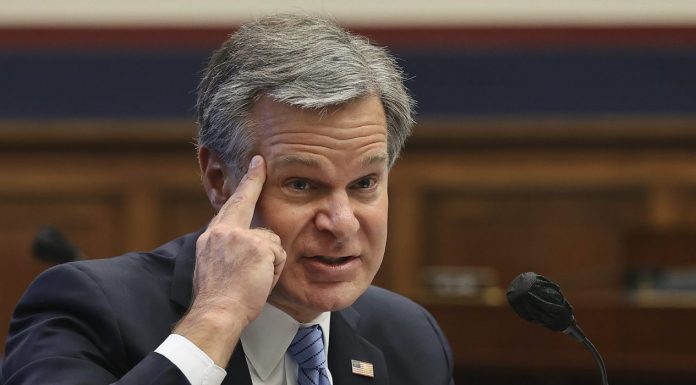Countering prior witness testimony from Senate Judiciary Hearings, FBI Director Chris Wray told lawmakers Thursday that Antifa is an ideology, not an organization.
Wray’s claim put him at odds with President Donald Trump and many of the administration’s other law-enforcement officials.
Trump, with support from Wray’s boss, Attorney General William Barr, has called for the radical leftist organization to be designated as domestic terrorists, which would allow investigators, among other things, to track their mysterious funding sources.
Wray did not dispute that Antifa activists were a serious concern, calling them the “real thing” and saying the FBI had undertaken “any number of properly predicated investigations into what we would describe as violent extremism,” including Antifa.
But, he said, “It’s not a group or an organization. It’s a movement or an ideology.”
The hearing before the House Homeland Security Committee—established after the Sept. 11 attacks to confront the threat of international terrorism—focused almost entirely on violence by white supremacists and anti-government extremists.
But House Democrats, who led the hearing and framed the agenda, have long insisted that the threat of Antifa was a fantasy and have deflected on left-wing extremism by claiming right-wing radicals were the only true danger.
Wray sought to make clear the scope of the threats while resisting lawmakers’ attempts to steer him into politically charged statements.
When asked whether extremists on the left or the right posed the biggest threat, he pivoted instead to an answer about how solo actors, or so-called “lone wolves,” with easy access to weapons were a primary concern.
“We don’t we don’t really think of threats in terms of left, right, at the FBI. We’re focused on the violence, not the ideology,” he said later.
The FBI director said racially motivated white supremacists have accounted for the most lethal attacks in the U.S. in recent years.
“Within the domestic terrorism bucket, the category as a whole, racially motivated violent extremism is, I think, the biggest bucket within that larger group,” he said. “And within the racially motivated violent extremist bucket, people subscribing to some kind of white supremacist-type ideology is certainly the biggest chunk of that.”
However, the most lethal violence this year has come from anti-government activists, he added.
That, presumably, includes the Antifa attacks on law-enforcement, as well as recent mass shootings.
The committee’s emphasis on more domestic matters underscored the shift of attention by law enforcement at a time of intense divisions and polarization inside the country.
But Democrats also took the opportunity to invoke their go-to international boogeyman, Russia, yet again claiming the Kremlin was planning to interfere in the election on Trump’s behalf.
Intelligence agencies have warned that several bad actors, including Russia, China and Iran are all deeply involved in election-interference operations.
Wray affirmed the intelligence community’s assessment of Russian interference, which he said was taking the form of foreign influence campaigns aimed at sowing discord and swaying public opinion as well as efforts to denigrate Democratic presidential nominee Joe Biden.
He said that the U.S. had not yet seen targeting of election infrastructure like in 2016.
“What concerns me the most is the steady drumbeat of misinformation and sort of amplification of smaller cyber intrusions,” Wray said. “I worry over time that they will contribute over time to a lack of confidence of American voters and citizens in the validity of their vote.”
He added that would be “a perception, not a reality.”
Following the discrediting of the Left’s 2016 conspiracy theories about Russia collusion Trump has emphasized about intelligence officials’ assessment that China prefers Biden.
Department of Homeland Security Acting Secretary Chad Wolf had been scheduled to appear at the House hearing on worldwide threats but did not testify because of his nomination to be secretary, according to the agency.
The agency said in a statement ahead of the hearing that it would be “contrary to standard practice” to have him testify while his nomination was pending before the Senate.
Acting Deputy Secretary Ken Cuccinelli said in a statement that he was prepared to appear in place of Wolf, but that was rejected by the Democratic-controlled committee.
Rep. Bennie Thompson, the committee chairman, began the hearing by noting there is no law prohibiting the testimony of someone facing a confirmation hearing and that Wolf has given multiple media interviews since the president announced his nomination.
The Department of Homeland Security ignored a committee subpoena issued Friday for Wolf’s appearance, which the Mississippi Democrat said should “appall” any member of the committee.

